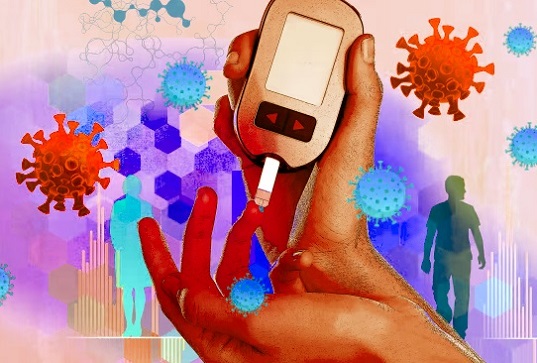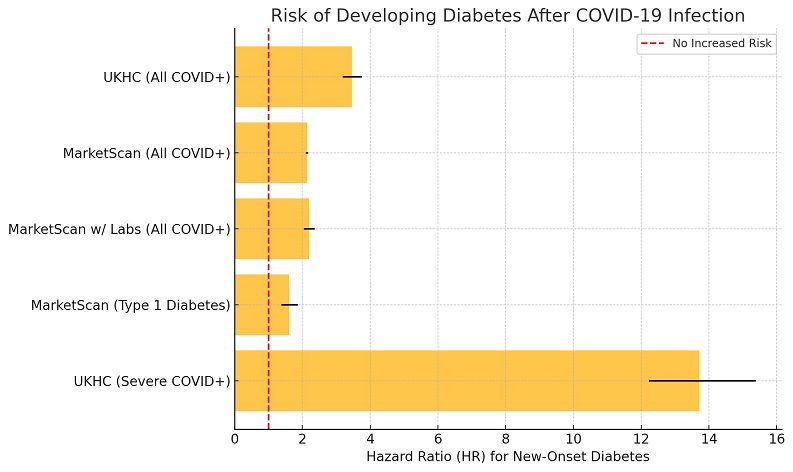Severe COVID-19 Increases Diabetes Risk by 1,271 Percent While Mild Cases Show Over 100 Percent Increase!
Nikhil Prasad Fact checked by:Thailand Medical News Team Apr 18, 2025 1 day, 6 hours, 58 minutes ago
Medical News: A shocking new study has confirmed what many healthcare professionals have feared since the early days of the pandemic — COVID-19 infections, particularly severe ones, are dramatically increasing the risk of developing diabetes. In fact, individuals with severe COVID-19 were found to have a staggering 1,271% higher risk of developing new-onset diabetes, while even those with mild or non-hospitalized infections had their risk doubled.
 Severe COVID-19 Increases Diabetes Risk by 1,271 Percent While Mild Cases Show Over 100 Percent Increase
Severe COVID-19 Increases Diabetes Risk by 1,271 Percent While Mild Cases Show Over 100 Percent Increase
The research, conducted by scientists from the University of Kentucky, analyzed data from nearly 9 million patients across three massive healthcare databases. The aim was to determine whether people infected with COVID-19 during the first 18 months of the pandemic were more likely to be diagnosed with diabetes — and how the severity of their illness impacted that risk.
This
Medical News report delves into the details of this critical study and what it means for public health globally, especially as COVID-19 continues to spread in its newer, stealthier variants.
Three Databases, One Alarming Pattern
The research team, led by Dr. Mary E. Lacy and Dr. Philip A. Kern, sourced data from:
-
University of Kentucky HealthCare (UKHC): A public health database of nearly 900,000 patients.
-
Merative MarketScan: A private insurance claims database containing over 8.9 million patients.
-
MarketScan with Labs: A specialized subset of the MarketScan data, including detailed lab results from 1.4 million individuals.
Using these sources, the researchers constructed three patient cohorts: a prepandemic group (before March 2020), a pandemic group without COVID-19 (COVID-negative), and a group with confirmed COVID-19 (COVID-positive). Across all datasets, patients with COVID-19 had significantly higher rates of newly diagnosed diabetes.
Risk Rises with Severity
The most striking findings came from the UKHC dataset, which included patients from underserved and higher-risk populations. Individuals who had been hospitalized for COVID-19 and received interventions like oxygen therapy, ICU care, mechanical ventilation, or ECMO had the highest diabetes risk, with a hazard ratio (HR) of 13.71 — equivalent to a 1,271% increased risk compared to those who never had COVID-19.
However, it wasn’t just those with severe cases who were affected. Even people treated as outpatients — who had mild or moderate infections — saw a significant increase in diabetes risk. The adjusted hazard ratio in these cases was around 2.13, indicating a 113% higher chance of developing diabetes than uninfected individuals.
;Findings Consistent Across All Populations
Regardless of age, sex, or database, the pattern remained the same: people with a confirmed COVID-19 infection were significantly more likely to develop diabetes. Some key statistics include:
-UKHC database: Adjusted HR of 3.46 (246% increase)
-MarketScan: Adjusted HR of 2.13 (113% increase)
-MarketScan with Labs: Adjusted HR of 2.20 (120% increase)
Even when comparing COVID-positive patients to those who had other respiratory infections like acute upper respiratory infections (AURI), the increased risk for diabetes remained significantly higher in the COVID group.
Type 1 Diabetes Also on the Rise
While most new diabetes diagnoses were likely to be type 2 (T2D), the researchers also looked at cases of new-onset type 1 diabetes (T1D), a more rare autoimmune condition that usually affects children and young adults.
In the MarketScan database, 226 new cases of T1D were documented among COVID-positive individuals, compared to 3,000 in the COVID-negative group. After adjusting for age and other variables, the researchers calculated a hazard ratio of 1.61 — indicating a 61% higher risk of developing T1D post-COVID infection.
This finding aligns with previous smaller studies suggesting that COVID-19 may trigger autoimmune reactions in some individuals, possibly through a mechanism known as molecular mimicry or direct beta-cell damage in the pancreas.

Image Credit: Thailand Medical News
Why Is COVID-19 Causing Diabetes?
Scientists are still investigating the exact reasons behind this disturbing link, but several theories are gaining traction:
-Inflammatory Stress: COVID-19 triggers a massive inflammatory response in the body, which may disrupt insulin production and regulation.
-Direct Viral Damage: The SARS-CoV-2 virus can infect pancreatic cells, impairing their ability to produce insulin.
-Steroid Use During Hospitalization: Patients with severe COVID often receive corticosteroids, which are known to increase blood sugar levels.
-Unmasking of Prediabetes: The stress of the infection may accelerate the progression from prediabetes to full-blown diabetes in those already at risk.
-Autoimmunity: In the case of T1D, viral infections like SARS-CoV-2 might trigger the body to attack its own insulin-producing cells.
Public Health Implications
The implications of this study are profound. With hundreds of millions infected globally, the potential burden of new-onset diabetes post-COVID could overwhelm healthcare systems, particularly in countries where diabetes management is already a challenge.
Moreover, many people who had mild or asymptomatic COVID-19 may not realize they are at increased risk. This underscores the importance of post-infection monitoring for signs of high blood sugar, especially among older adults and those with pre-existing risk factors like obesity or family history of diabetes.
Study Limitations
The researchers acknowledge certain limitations. For instance, the reliance on ICD-10 codes and prescription records may not capture every diabetes case, and the study couldn't determine how long the elevated diabetes risk persists after infection. Additionally, the data only covered the first 18 months of the pandemic and didn’t account for newer COVID-19 variants or long COVID.
Still, the strength of the data — drawn from millions of patients across diverse demographics — provides compelling evidence that COVID-19 significantly contributes to the global diabetes crisis.
Conclusions
This large-scale study provides indisputable evidence that COVID-19 infections dramatically increase the risk of new-onset diabetes, regardless of age, sex, or previous health conditions. The association is even more pronounced in patients who experienced severe illness requiring hospitalization or ICU-level interventions, where the risk soars to over 1,271 percent. However, even mild infections aren't without consequence, with data showing a consistent 100–120 percent increase in diabetes incidence. These findings hold true across private insurance databases, lab-confirmed patient populations, and large academic health systems — making the results universally applicable. The possibility that SARS-CoV-2 can contribute to both type 1 and type 2 diabetes adds another layer of concern, especially for younger individuals.
This study also serves as a stark warning for public health agencies worldwide — highlighting the need for long-term metabolic monitoring of COVID-19 survivors, particularly in populations with existing health disparities. As the virus continues to evolve, and reinfections become more common, the long-term ripple effects on global diabetes prevalence could be devastating unless urgent screening and preventative care are prioritized.
The study findings were published in the peer-reviewed journal: Diabetes Research and Clinical Practice
https://www.sciencedirect.com/science/article/pii/S0168822725002049
For the latest COVID-19 News, keep on logging to Thailand Medical News.
Read Also:
https://www.thailandmedical.news/news/alpha-lipoic-acid-reduces-harmful-compounds-in-type-2-diabetes-patients-with-neuropathy
https://www.thailandmedical.news/news/japanese-study-finds-that-ficus-pumila-l-extract-boosts-insulin-secretion-and-insulin-resistance-in-post-covid-19-diabetes
https://www.thailandmedical.news/news/type-2-diabetes-causes-diastolic-dysfunction-and-subclinical-left-ventricular-dysfunction-over-time
https://www.thailandmedical.news/pages/thailand_doctors_listings
https://www.thailandmedical.news/articles/hospital-news

